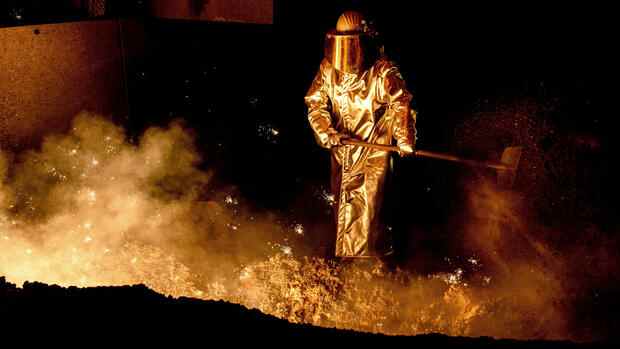Berlin SPD leader Lars Klingbeil wants to use an industrial policy offensive to avert de-industrialization in Germany and make the German economy more robust. “The industrial core of Germany is threatened by the current situation,” said Klingbeil in an interview with the Handelsblatt. At the same time, the German economy is confronted with a “completely changed global political situation”.
He is concerned about the isolation of authoritarian states, but also about the “tough industrial policy” of the USA. “We now have maybe a five-year window to make the industry in Germany and Europe strong,” he said.
Therefore, the state must invest in the development of certain industries, such as semiconductor production or battery production, and develop a “raw materials strategy”. This would also promote independence from China. In dealing with the country, Klingbeil pleaded for a new strategy: “We have to name security-related areas that China has to stay out of.”
Chancellor Olaf Scholz (SPD) will travel to Beijing with a business delegation on Thursday and will meet China’s head of state and party leader Xi Jinping on Friday. Klingbeil defended the trip against criticism: dialogue is important. The Chancellor will also address critical issues.
Other coalition politicians expressed this expectation on Wednesday. “The turning point proclaimed by Olaf Scholz must also be filled with life when dealing with China,” said FDP General Secretary Bijan Djir-Sarai.
Top jobs of the day
Find the best jobs now and
be notified by email.
A turning point: when the economy calls for the state
In fact, the turning point since Russia’s war of aggression against Ukraine has not only changed security policy. Economically, too, many certainties are currently dissolving into thin air. This was recently read in a policy paper by the industry association BDI. There was also talk of a “turning point” in economic policy, which is why Europe must “strengthen its sovereignty”.
For decades, the economy has been promoting the withdrawal of the state, but in view of the Ukraine war and the economic rise of autocracies, the economy is now rethinking. According to the paper, Germany’s traditional economic positions “must be supplemented by suitable economic and security policy measures”. The goal is a “balance between welfare and security goals”. Cooperation with China in particular must be redefined.
>>Read more: The Loss of Control – How China’s Communist Party is expanding its influence on German corporations
SPD leader Klingbeil also has these thoughts in mind when he makes a surcharge for a new industrial policy in the Handelsblatt. While the former Economics Minister Peter Altmaier (CDU) was mocked for his attempt to define systemically important sectors and companies that the state should protect against foreign takeovers, such an industrial policy geared to national interests has long been common practice around the world. Everyone has one country in particular in mind: China.
US President Joe Biden, for example, is using his latest anti-inflation law to promote economic decoupling from China – and, if necessary, will also accept short-term damage for US corporations. Other countries such as Japan have also passed laws designed primarily to encourage their own companies to look for trading partners outside of China.
There are no such laws in Germany yet, but a debate about a new China policy and thus a new industrial policy is in full swing. The entry of the Chinese state-owned company Cosco at a terminal in the port of Hamburg, which Chancellor Scholz pushed through against great resistance, and the Chancellor’s trip to China, which was discussed, have also drawn attention in Germany to whether the Federal Republic is not too dependent on the People’s Republic. And makes the same mistakes in dealing with China as with Russia.
Chancellery defends business delegation in China plane
According to government circles, the Chancellor also wants to address “difficult issues” in relation to China at his first personal meeting with China’s head of state Xi on Friday. At the top of the list: China’s stance on the Ukraine war. From Germany’s point of view, Russia’s war of aggression violates the Charter of the United Nations (UN). In an article in the “Frankfurter Allgemeine Zeitung”, Scholz reminded the leadership in Beijing of their “special responsibility” as a permanent member of the UN Security Council.
There was also criticism of the Scholz trip because of the taking of a business delegation. This was interpreted as “business as usual” when dealing with China. According to government circles, however, the Federal Chancellor is not traveling to China as the “top commercial representative of Deutschland AG”. The companies are there because they stand for various structural difficulties in economic relations. The composition should give weight to the arguments of the federal government, it said.
More: Sharp criticism of Chinese influence on German companies
